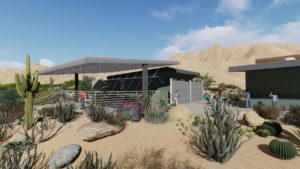Read about Camp Cooper’s renovation plans
by reporter Jessica Votipka from the Arizona Daily Star and Tucson.com.
Rendering of upcoming improvements to Cooper Center for Environmental Learning.
Courtesy Camp Cooper
Camp Cooper is getting its first renovation since the 1960s as the environmental learning center celebrates its 60th year.
Construction has begun on the Cooper Center for Environmental Learning’s $2.7 million new restroom facilities. The months-long renovation will include a new building featuring composting toilets and waterless urinals. The existing building will be renovated into a shower house.
The project will also include other sustainable features, such as new solar panels, outdoor classroom space, greywater systems for shower wastewater and 23,213 gallons of rainwater harvesting to grow shade trees and other nearby natural vegetation.
Eighty percent of the center’s programs serve Tucson Unified School District students, but the outdoor learning space at 5403 W. Trails End Road is open to all Southern Arizona schools. More than 140,000 students have learned at the Cooper Center since 1964. Among other services, Camp Cooper is a popular location for field trips, giving students a safe, accessible place to experience nature while enhancing classroom learning.
The UA College of Education partners with TUSD for Camp Cooper’s 10-acre “living classroom,” nestled in the Tucson Mountains’ foothills. TUSD is responsible for facility maintenance and utilities at the center. The College of Education takes care of operations and programs, including fundraising.
The Cooper Center uses research-based teaching and programming to teach students about science and Earth education.
Programming will be adjusted to accommodate the construction project. There will be different path entrances, scheduling around the noisier periods of renovation and a full-service, portable bathroom trailer with handwashing stations.
Money for the renovation comes from philanthropy through Cooper Center’s charitable foundations and local businesses, corporations and individuals.
With phase one underway, future phases are expected to be completed within three to five years. These will include upgraded sleeping cabins, an expanded indoor classroom, office space and a commercial kitchen for sustainable food service. Funding will be provided, in part, by the TUSD bond issue approved by voters in November.
“We’re excited to share the wonders of our Sonoran Desert classroom with a larger audience, thanks to these much-needed renovations,” said Camp Cooper program coordinator Mariah
By Reporter Jessica Votipka for the Arizona Daily Star and Tucson.com. Contact: jvotipka@tucson.com.

